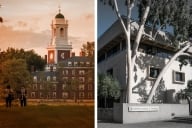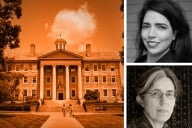You have /5 articles left.
Sign up for a free account or log in.
For the last year, Davidson College has had a series of discussions over whether it should keep a requirement in the college's bylaws that the president be a Presbyterian. Those who attended the public discussions said that students and professors alike seemed to agree that it was time for the requirement to go. Such requirements were common at private colleges when Davidson was founded in 1837. But students today enroll at Davidson because of the quality of its liberal arts education, not because they are seeking a Presbyterian college, and the college's board -- not a denominational leader -- governs the college.
Some religious colleges continue to educate only those of a single faith. But Davidson, like many colleges with religious roots, is now a place where most students and faculty members are not Presbyterian, where students aren’t required to study religion and where diversity and inclusion are values that are discussed more than faith.
So when the college’s board announced recently that it had finished a review of the issue, many on the campus were hopeful for a change. But the news was that the board was sticking with the requirement. And that has angered many on the campus.
The faculty voted on Thursday to oppose the decision. Students have organized a protest movement that is gathering petitions. And critics of the board say that it has shown a disregard for those who are at the college today and also for the values that attracted many to the campus.
"This isn’t a movement about changing Davidson. This is about affirming what Davidson is," said J.D. Merrill, a senior who is an education policy studies major and one of the organizers of a new student group pushing to end the requirement. Imposing a religious test on anyone, he said, "contradicts our traditions of inclusiveness and equality."
While Merrill speaks with pride of his Davidson education, he said he would never have enrolled at a college had he believed – as one raised as a Quaker – that it judged him to be somehow deficient with regard to the college’s values. "If they told me, 'J.D. you are a great guy. You can come here but you can't be our president,' I wouldn’t have come. Why would anyone who is not of the Presbyterian faith enroll here if they tell you that?"
The issue of the presidential religion requirement has been discussed periodically at the college, but surfaced again in the search that led to the hiring of Carol Quillen in 2011. The board said at the time that it didn’t want to consider a change in the requirement while also doing a search, and proceeded to hire Quillen, who is Presbyterian. But the board agreed that the best time to review the issue would be early in her tenure, well before the next presidential search, so that the issue would be considered without regard to the merits of any candidate for the presidency.
In a statement explaining the decision not to change anything, the board chair, Mackey McDonald, said that the board acknowledged "that there are differing views among the trustees with regard to the presidential bylaw and recognized that there does not exist sufficient support for any particular change to it."
The phrase "sufficient support" has been particularly galling to many on the campus, who feel that it suggests that the broad support from those who are actually at Davidson today isn't "sufficient" to count in the view of trustees. The student movement opposing the religious test has called itself Sufficient Support, and the group has drawn attention to just how many students are deemed by the college as unworthy of ever leading it. One graphic on the website reads "9 out of 10 Davidson students ineligible to be president."
In an interview, McDonald stressed that the board does not want to be seen as questioning the value of any other faith, but does want to preserve the tradition of having a Presbyterian president. “Values can come from many places,” he said. “For Davidson, they came from our founders, who were in the Presbyterian Church, and we want to make sure we don’t do anything to change those values.”
Is Exclusion a Presbyterian Value?
Many of the critics of that policy cite their view that true equity does not involve favoring some groups over others. But when the faculty met last week to discuss the issue, many said it was significant that the motion questioning the board’s decision came from Douglas F. Ottati, a Presbyterian theologian and church elder who is the Craig Family Distinguished Professor of Reformed Theology and Justice at Davidson.
He argued that the board’s action runs counter to Presbyterian teachings.
The Reformed tradition "wants to support a college of liberal arts and sciences that will further what is called 'true religion' in the tradition," he said. That tradition "encourages people to engage in free inquiry. This is a tradition that thinks when you are studying the world, you are studying God's world." This world view "wants to invite people to practice and reflect on their commitments -- religious and non-religious," he said.
Also important to this philosophy, he said, is a distrust of hierarchy, and a view that "you never give all of the power to one person."
Ottati said that it's true that there are colleges of strong academic quality that require everyone to sign a statement of faith or share a specific set of beliefs. And he said that many colleges founded in a tradition of faith have decided to "just relinquish it."
He said he believes there is much to be gained by "a middle road in which you try to embody this tradition, but at the same time you are not going to be exclusionary." Davidson will be true to its heritage, he said, if it ends the religious test, but simply states that it expects good candidates for president to understand, appreciate and support the college's religious roots and values. Many such people are not Presbyterian, he said.
It's true, he said, that some people fear a shift would result in a loss of religious identity. But Ottati stressed that the religious identity of Davidson is an inclusive one, and that the board is diverging from that religious tradition. "If we have an exclusionary requirement we're going to end up undercutting some of these most deeply held traditions," he said. "If the only way to save a tradition is to kill it, that's not a happy circumstance."
Davidson last had a big debate over religious requirements in 2005, when the college ended a requirement that all board members be Presbyterians. The college adopted rules that said that at least 24 of the 44 board members must be Presbyterians and that at least 80 percent of board members must be Christians. At that time, two trustees who had been major donors quit the board.
Ottati said that he believes strongly that Davidson needs to have Presbyterian board members. He said that all board members should have "an understanding of the religious heritage" of the college and that that some "participate in the religious heritage." But he noted that board members are picked for a variety of qualities, including their ability to contribute to fund-raising, their knowledge of nonprofit governance and so forth.
Why not, he said, look at Presbyterian faith "as a positive" factor in recruiting trustees, and end all traditions of exclusion? "In a president you would like someone who understands the religious affiliation of the school and how it contributes to a liberal education, and who can represent that," he said. "That's more important than where a president goes to church."








